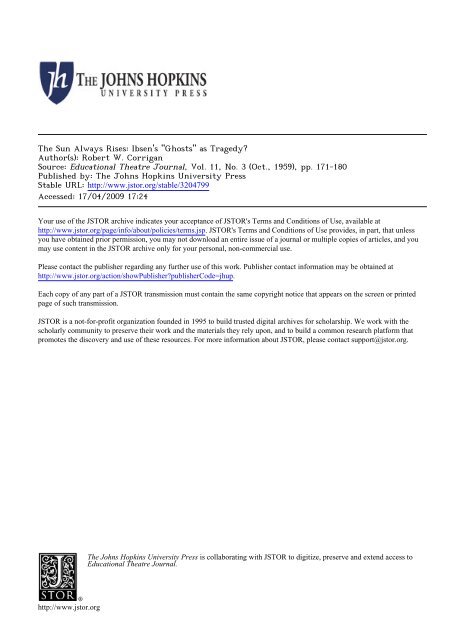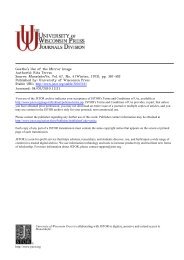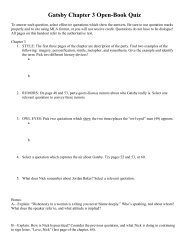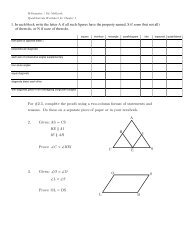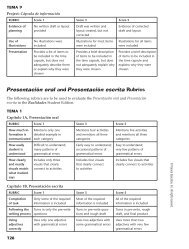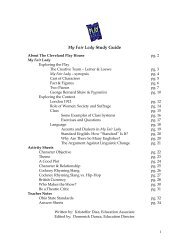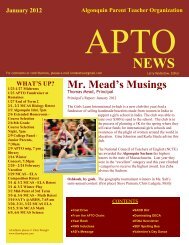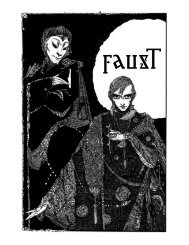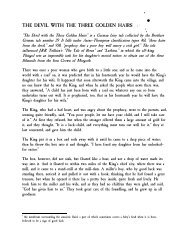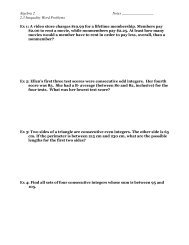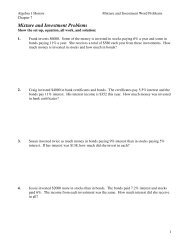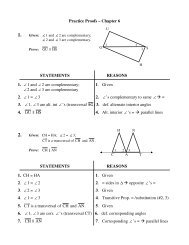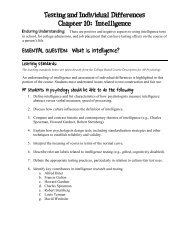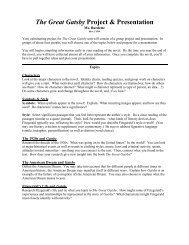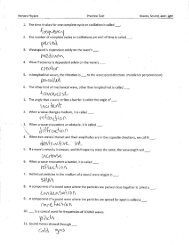Ghosts Critical Essay
Ghosts Critical Essay
Ghosts Critical Essay
Create successful ePaper yourself
Turn your PDF publications into a flip-book with our unique Google optimized e-Paper software.
The Sun Always Rises: Ibsen's "<strong>Ghosts</strong>" as Tragedy?<br />
Author(s): Robert W. Corrigan<br />
Source: Educational Theatre Journal, Vol. 11, No. 3 (Oct., 1959), pp. 171-180<br />
Published by: The Johns Hopkins University Press<br />
Stable URL: http://www.jstor.org/stable/3204799<br />
Accessed: 17/04/2009 17:24<br />
Your use of the JSTOR archive indicates your acceptance of JSTOR's Terms and Conditions of Use, available at<br />
http://www.jstor.org/page/info/about/policies/terms.jsp. JSTOR's Terms and Conditions of Use provides, in part, that unless<br />
you have obtained prior permission, you may not download an entire issue of a journal or multiple copies of articles, and you<br />
may use content in the JSTOR archive only for your personal, non-commercial use.<br />
Please contact the publisher regarding any further use of this work. Publisher contact information may be obtained at<br />
http://www.jstor.org/action/showPublisher?publisherCode=jhup.<br />
Each copy of any part of a JSTOR transmission must contain the same copyright notice that appears on the screen or printed<br />
page of such transmission.<br />
JSTOR is a not-for-profit organization founded in 1995 to build trusted digital archives for scholarship. We work with the<br />
scholarly community to preserve their work and the materials they rely upon, and to build a common research platform that<br />
promotes the discovery and use of these resources. For more information about JSTOR, please contact support@jstor.org.<br />
The Johns Hopkins University Press is collaborating with JSTOR to digitize, preserve and extend access to<br />
Educational Theatre Journal.<br />
http://www.jstor.org
THE SUN ALWAYS RISES:<br />
IBSEN'S GHOSTS AS TRAGEDY?<br />
ROBERT W. CORRIGAN<br />
"What profit has man of all his labour wherein<br />
he laboureth under the sun? One generation<br />
passeth away, and another generation cometh;<br />
but the earth abideth forever. . . . The sun<br />
also ariseth, and the sun goeth down, and<br />
hasteth to the place where he arose."<br />
. . . Ecclesiastes<br />
<strong>Ghosts</strong> created the biggest stir in Europe<br />
of all of Ibsen's plays. It was the<br />
hallmark of the Free Theatre movement.<br />
Antoine at the Theatre Libre, Brahm<br />
at the Freie Buehne, and Grein at the<br />
Independent Theatre in London all<br />
produced this play as a symbol and a<br />
harbinger of their freedom. But the<br />
play was violently received. It shocked<br />
respectable middle-class audiences everywhere;<br />
it was condemned and banned;<br />
for the young turks of liberalism it was<br />
a banner to be waved on high. From the<br />
beginning the play had a notoriety that<br />
Ibsen only partially intended.<br />
Fortunately, <strong>Ghosts</strong> is now seen in<br />
clearer perspective and we tend to be<br />
amused by the critical reaction of the<br />
Nineties. But <strong>Ghosts</strong> is still a controversial<br />
play. The number of respectable<br />
interpretations currently making the<br />
rounds is large and when you get on<br />
the subject of <strong>Ghosts</strong> as tragedy-well,<br />
it is one of those plays, like Death of a<br />
Salesman, it just won't stay settled and<br />
is always good for an argument. The<br />
four major interpretations of the play<br />
usually advanced are: First, Ibsen wrote<br />
<strong>Ghosts</strong> as an answer to the objections<br />
raised by Nora's flight from her hus-<br />
Robert W. Corriaan is a member of the staff of<br />
Tulane University, and the editor of the Tulane<br />
Drama Review.<br />
band and children in A Doll's House.<br />
Tied to a worse husband than Helmar,<br />
Mrs. Alving, instead of leaving him, had<br />
decided to stay, and to cover up the<br />
"corpse" of her married life with respectable<br />
trappings.' Second: Mrs. Alving<br />
and Oswald are the victims of a<br />
two-fisted fate which takes the form of<br />
the laws of heredity in a mechanistic<br />
world and the stultifying and debilitating<br />
conventions of respectability. Third:<br />
Hereditary disease was for Ibsen the<br />
symbol of all the determinist forces that<br />
crush humanity, and, therefore, he<br />
sought to put in opposition to these<br />
forces the strongest of all instincts-maternal<br />
passion. And, finally, there is a<br />
fourth group of critics who dismiss the<br />
play as irrelevant except as an historical<br />
landmark. They argue that although<br />
the play may have been revolutionary<br />
in its day, today any dramatic conflict<br />
which presents suffering and a shot of<br />
penicillin as its alternatives is not very<br />
convincing. All of these interpretations<br />
-and they have been persuasively argued<br />
by responsible critics-seem to me<br />
to be either misreadings of the play or<br />
beside the point. They are comments<br />
about the play, but they are ancillary<br />
and fail to recognize the underlying conflict<br />
of the play. For this reason most<br />
modern commentaries on <strong>Ghosts</strong> fail to<br />
describe and interpret the central action<br />
which Ibsen is imitating, and this has<br />
resulted in many limited or erroneous<br />
discussions of the play as a tragedy. It<br />
Janko Lavrin, Ibsen, London, 195o, p. 81.
172<br />
is this central action and its tragic implications<br />
which I wish to discuss, and this<br />
can best be done by first turning to Ibsen<br />
the man and the artist.<br />
I<br />
Ibsen's biography is a study in conflict<br />
and contradiction. The gadfly of<br />
bourgeoisie morality was helplessly bourgeois;<br />
the enemy of pietism was a guiltridden<br />
possessor of the worst kind of<br />
"Lutheran" conscience; the champion<br />
of the "love-life of the soul" was inca-<br />
pable of loving; the militant spokesman<br />
against hypocrisy and respectability was<br />
pompous and outraged at any breach of<br />
decorum. Ibsen's life is the contradiction<br />
of those values affirmed in his<br />
plays. This should not confuse us, however,<br />
if we will look even briefly at some<br />
of the significant events in a life that<br />
was really quite dull.<br />
Ibsen was born into an atmosphere of<br />
fairly prosperous parochial respectability.<br />
His father was a small-time shipping<br />
tycoon in the little town of Skien. In<br />
1836, when Ibsen was eight years old,<br />
his father went bankrupt and was accused<br />
of embezzlement and forgery. The<br />
charges were never proved, but the family<br />
was ostracized and reduced to a<br />
grubbing kind of poverty. When Ibsen<br />
was sixteen he left his family, amidst<br />
bitter renunciations on both sides, never<br />
to see or correspond with them again.<br />
Even when his parents died he failed<br />
to return or write. He wrote to a friend<br />
on the occasion of his father's death that<br />
he was "unable to offer assistance of<br />
any kind." So at sixteen Ibsen went to<br />
the dismal town of Grimstead as an<br />
apprentice in pharmacy. Here he had<br />
an illegitimate son, Hans Jakob, and<br />
once again was "run out of town." He<br />
left Grimstead, leaving mother and child<br />
stranded, and never took the slightest<br />
interest in them. He went to Christiana<br />
EDUCATIONAL THEATRE JOURNAL<br />
(now Oslo) to begin his career as a<br />
writer and failed. In 1851 he was hired<br />
as director and dramaturg of the new<br />
Bergen National Theatre. Again, Ibsen<br />
was a failure. Letters and memoirs of<br />
actors in his company show him to have<br />
been incompetent as both a director<br />
and as a manager; and the plays written<br />
expressly for the theatre in his role<br />
as dramaturg were all miserable flops.<br />
Furthermore, he must have felt failure<br />
in his personal life. He fell in love three<br />
times in Bergen, and in each instance<br />
the girl's father broke off the affair because<br />
Ibsen was not suitable as a son-inlaw.<br />
By 1857 he was on the verge of<br />
being fired; friends stepped in and got<br />
him a job as director of the newly organized<br />
Norwegian Theatre in Christiana.<br />
But failure followed him and by<br />
1862 the National Theatre was bankrupt<br />
both artistically and financially and Ibsen<br />
was bitterly denounced by the press.<br />
Once again, friends came to his aid and<br />
he was given a small dole in the form<br />
of a literary scholarship to study abroad.<br />
The story of Ibsen's success as an international<br />
playwright is well-known<br />
and in 1891 he returned to Norway as a<br />
celebrity. In Christiana, where he settled<br />
for good, he became something of a national<br />
institution and was far from dis-<br />
liking such a status. All the frustration,<br />
humiliation, and rejection he had endured<br />
in youth and early manhood were<br />
now amply compensated for. He was<br />
wealthy and internationally famous. As<br />
if anxious to do full justice to his literary<br />
and social position, Ibsen increased<br />
his air of excessively dignified<br />
respectability. So much so that in all<br />
his external habits he was even more<br />
strict and methodical than those philistines<br />
whom he had ridiculed so aggressively<br />
in his plays. Immaculately<br />
dressed in his frock-coat and silk tophat,<br />
he took his daily walks along the
IBSEN'S GHOSTS AS TRAGEDY?<br />
same streets, sat at the same table in<br />
the same cafe (where the customers all<br />
respectfully rose whenever he entered),<br />
and went home at the same time-with<br />
the regularity of clockwork. He was<br />
also fond of displaying his numerous<br />
decorations and medals, which he used<br />
to collect and covet with the relish of<br />
a nouveau riche enjoying all the external<br />
insignia of his own importance.<br />
In short, Ibsen became a "pillar of<br />
society" in his last days; he was a regular<br />
speaker at the Norwegian equivalents<br />
of the Rotary Club, the AAUW,<br />
Labor Unions, and the Better Business<br />
Bureau. In his speeches he praised all<br />
of these groups and gratefully accepted<br />
their adulation and honors. His study<br />
walls were covered with plaques and<br />
certificates from civic organizations and<br />
only a bust of Strindberg-a bust that<br />
and demonic<br />
captured the penetrating<br />
quality of Strindberg's gaze-acted as an<br />
antidote to this display of middle-class<br />
self-righteousness. On March i5th, 1900<br />
Ibsen had a stroke, and another in the<br />
following year. These paralytic strokes<br />
were followed by amnesia and for six<br />
years he lay helplessly senile. He died<br />
on May 23rd, 1906, at the age of seventy-<br />
eight.<br />
The clue to the meaning of all Ibsen's<br />
plays lies in this strange biography. Ib-<br />
sen's plays are a continuous act of expiation.<br />
Certainly, it is significant that<br />
bankruptcy and the resultant rejection<br />
by society appears in four of his plays;<br />
the desire to restore the family honor is<br />
central to two more; and there are illegitimate<br />
children in eight plays.<br />
Thematically, the plays are, almost without<br />
exception, patterned in a similar<br />
way: a hidden moral guilt and the fear<br />
of impending retribution. Structurally,<br />
the plays are epilogues of retribution.<br />
All of the plays after Peer Gynt, begin<br />
on a happy note late in the action. In<br />
173<br />
each case the central figure has a secret<br />
guilt which is soon discovered. As the<br />
play progresses, by series of expository<br />
scenes (scenes which delve into the past<br />
and are then related to the present condition<br />
of the characters), a sense of the<br />
foreboding doom of impending retribu-<br />
tion envelops the action and each of<br />
the plays ends with justice, in the form<br />
of moral fate having its way. And finally,<br />
beginning with <strong>Ghosts</strong>, Ibsen introduces<br />
the theme of expiation. In every play<br />
following <strong>Ghosts</strong>, at least one of the central<br />
characters feels the need to exorcise<br />
his guilt, doubt, or fear by some form<br />
of renunciation.<br />
Perhaps more important is the fact,<br />
that as Ibsen's art developed these<br />
themes and attitudes changed in tone<br />
and form. The guilt, which had been<br />
specific in the early days-Bernick's lie,<br />
Nora's forgery, Mrs. Alving's returnbecomes<br />
more and more abstract, nebulous,<br />
and ominous as best evidenced<br />
in the nameless guilt of Solness and<br />
Rosmer. The fear, which in the early<br />
plays had been the fear of discovery,<br />
becomes a gnawing anxiety. Self-realization,<br />
which in Brand is presented in<br />
terms of the Kierkegaardian imperative<br />
of either/or is realized in the later plays<br />
in an ambiguous kind of self-destruction.<br />
A-nd finally, significant action on the<br />
part of the characters has tendencies<br />
towards becoming a frozen stasis of<br />
meaningless activity and contemplation.<br />
Ibsen's life and his work are closely<br />
interwoven. Ibsen, rejected from society<br />
as a young man, had good reason to see<br />
the blindness of bourgeois respectability<br />
in his exile. And yet his sharp criticism<br />
of society is always balanced by his<br />
desire to be a part of that very society<br />
he saw and knew to be false. Over and<br />
over again in his plays and letters he<br />
condemns the hypocrisy, the intellectual<br />
shallowness, and the grim bleakness of
174<br />
his Scandinavian homeland. But he returned<br />
to it in pomp and circumstance.<br />
Herein lies the crux to an understanding<br />
of Ibsen's art in general and <strong>Ghosts</strong> in<br />
particular. More and more we see that<br />
both in Ibsen the man and in the characters<br />
of his plays the basic struggle is<br />
within.<br />
Ibsen lived in a time of revolution; he<br />
was a maker of part of that revolution;<br />
and he knew full well that all the things<br />
he said about bourgeois society were<br />
true. But despite his rational under-<br />
standing, his intellectual comprehension<br />
of this fact, he was driven by deeper<br />
forces within him not only to justify<br />
himself to that false society, but to become<br />
a part of it. It is this struggle within<br />
himself between his rational powers<br />
and the Trolls of the Boyg that best<br />
explains his life and work. Ibsen's<br />
plays are his attempts to quell the guilt<br />
he felt for desiring values which he<br />
knew to be false. In support of this<br />
point, I call attention to two important<br />
bits of evidence: the first is a letter<br />
written by Ibsen to Peter Hanson in<br />
1870:<br />
"While writing Brand, I had on my desk a<br />
glass with a scorpion in it. From time to time<br />
the little animal was ill. Then I used to give it<br />
a piece of soft fruit, upon which it fell furiously<br />
and emptied its poison into it-after which it<br />
was well again. Does not something similar happen<br />
to us poets? The laws of nature regulate<br />
the spiritual world also .. ."<br />
The second is a short poem entitled<br />
"Fear of Light" (presently, I shall relate<br />
the significance of that title to<br />
<strong>Ghosts</strong>):<br />
What is life? a fighting<br />
In heart and brain with Trolls.<br />
Poetry? that means writing<br />
Doomsday-accounts of our souls.<br />
I contend that Ibsen's plays were attempts-attempts<br />
that were bound to<br />
fail, just as Mrs. Alving's attempts were<br />
EDUCATIONAL THEATRE JOURNAL<br />
bound to fail-to<br />
relieve Ibsen of his<br />
guilt and at the same time were judgments<br />
of his failure to overcome the<br />
Trolls (which first appear as Gerd in<br />
Brand), those irrational forces and powers<br />
within man over which he has no<br />
control.<br />
Keeping these facts in mind, let us<br />
now turn to <strong>Ghosts</strong>. One does not have<br />
to be a very perceptive student of the<br />
theatre to realize that the "ghosts" Ibsen<br />
is talking about are those ghosts of<br />
the past that haunt us in the present.<br />
In fact, Ibsen has often been criticized<br />
for using his ghost symbolism with such<br />
obviousness, such lack of subtlety, and<br />
so repetitiously. Certainly, when reading<br />
the play we feel this criticism is<br />
justified. Oswald's looking like Captain<br />
Alving; his interest in sex and liquor;<br />
his feelings toward Regina; his syphilitic<br />
inheritance; Paster Mander's influence<br />
over Mrs. Alving, the orphanage, and<br />
the fire are only a few of the "ghosts"<br />
that Ibsen uses as analogues to his theme.<br />
Alrik Gustafson puts it this way:<br />
"Symbols are, of course, a commonplace in<br />
Ibsen's dramas, but in his early plays before<br />
The Wild Duck he uses symbolistic devices<br />
somewhat too obviously, almost exclusively to<br />
clarify his themes. Any college sophomore can<br />
tell you after a single reading of Pillars of<br />
Society, A Doll's House, or <strong>Ghosts</strong> what the<br />
symbols expressed in these titles mean. The<br />
symbols convey ideas--and little else. They<br />
have few emotional overtones, are invested with<br />
little of the impressive mystery of life, the<br />
tragic poetry of existence. They tend to leave<br />
us in consequence cold, uncommitted, like after<br />
a debate whose heavy-handed dialectic has ignored<br />
the very pulse-beat of a life form which<br />
it is supposed to have championed."2<br />
But <strong>Ghosts</strong> is concerned with more<br />
than the external manifestations of an<br />
evil heritage. In those oft-quoted lines<br />
that serve as a rationale for the play,<br />
2 Alrik Gustafson, "Some Notes on Theme,<br />
Character, and Symbol in Rosmers-holm," The<br />
Carleton Drama Review, Vol. I, No. 2, pp. 9-10.
IBSEN'S GHOSTS AS TRAGEDY?<br />
Mrs. Alving says:<br />
"I am half inclined to think we are all ghosts,<br />
Mr. Manders. It is not only what we have inherited<br />
from our fathers and mothers that<br />
exists again in us, but all sorts of old dead<br />
ideas and all kinds of old dead beliefs and<br />
things of that kind. They are not actually<br />
alive in us; but there they are dormant, all<br />
the same, and we can never be rid of them ....<br />
There must be ghosts all over the world ....<br />
And we are so miserably afraid of the light,<br />
all of us . . . and I am here, fighting with<br />
ghosts both without and within me."<br />
The ghosts of plot and symbol are the<br />
manifestations of Mrs. Alving's struggle<br />
with the ghosts within. It is this internal<br />
conflict, a conflict similar to Ibsen's personal<br />
struggle, that is the play's central<br />
action.<br />
To define this action more explicitly,<br />
I would say that Ibsen is imitating an<br />
action in which a woman of ability and<br />
stature finds her ideals and her intellectual<br />
attitudes and beliefs in conflict<br />
with an inherited emotional life determined<br />
by the habitual responses of<br />
respectability and convention. As the<br />
play's form evolves it becomes apparent<br />
that the values Mrs. Alving affirms in<br />
intellectual terms are doomed to defeat<br />
because she has no control over her emotional<br />
inheritance-an inheritance of<br />
ghosts which exists, but which cannot<br />
be confined to or controlled by any<br />
schematization of the intelligence.<br />
Every significant choice that Mrs. Alving<br />
has ever made and the resultant action<br />
of such a decision is determined by<br />
these ghosts of the past rather than by<br />
intellectual deliberation. To mention<br />
but a few instances: Her marriage to<br />
Captain Alving in conformity to the<br />
wishes of her mother and aunts; her return<br />
to her husband; her reaction to<br />
the Oswald-Regina relationship; her<br />
acceptance of Manders after she has seen<br />
and commented upon the hypocrisy of<br />
the scene with Engstrand; her failure<br />
175<br />
to tell Oswald the "straight" truth about<br />
his father; the horror of her reaction<br />
when Oswald is indifferent to his father's<br />
life; and finally, the question mark<br />
with which the play ends. All of these<br />
scenes are evidence that Mrs. Alving's<br />
ideals of freedom and her rhetorical<br />
flights into intellectual honesty are of<br />
no use to her when it comes to action.<br />
Perhaps, I can make my point more<br />
clear by briefly developing two of the<br />
above mentioned episodes.<br />
As the second act opens, Mrs. Alving<br />
comes to a quick decision about Oswald's<br />
relationship with Regina: "Out of the<br />
house she shall go-and at once. That<br />
part of it is clear as daylight." I will<br />
return to the relationship of light to enlightenment,<br />
but for the moment we see<br />
that Mrs. Alving's decision is based upon<br />
an emotional response determined by<br />
her inheritance of respectability. Then,<br />
Mrs. Alving and the pastor begin to<br />
talk; and Mrs. Alving always talks a<br />
good game. After better than four pages<br />
of dialogue, Mrs. Alving is finally able<br />
to exclaim: "If I were not such a miserable<br />
coward, I would say to him:<br />
'Marry her, or make any arrangement<br />
you like with her-only let there be no<br />
deceit in the matter.'" The pastor is<br />
properly shocked when Mrs. Alving<br />
gives him the "face the facts of life"<br />
routine; but her liberation, which is<br />
only verbal, is short lived! Manders asks<br />
how "you, a mother, can be willing to<br />
allow your . . ." This is Mrs. Alving's<br />
reply: "But I am not willing to allow<br />
it. I would not allow it for anything in<br />
the world; that is just what I was saying."<br />
Or to take another situation. In Act<br />
I, Mrs. Alving tells Manders what her<br />
husband was really like: "The truth is<br />
this, that my husband died just as great<br />
a profligate as he had been all his life."<br />
In Act II, she is telling Manders of all
176<br />
the things she ought to have done and<br />
she says: "If I had been the woman I<br />
ought, I would have taken Oswald into<br />
my confidence and said to him: 'Listen,<br />
my son, your father was a dissolute<br />
man." In the third act circumstances<br />
have forced iMrs. Alving to tell Oswald<br />
the truth about his father: "Your poor<br />
father never found any outlet for the<br />
overmastering joy of life that was in<br />
him. And I brought no holiday spirit<br />
into his house, either; I am afraid I<br />
made your poor father's home unbearable<br />
to him, Oswald."<br />
Whhen we come to see the big scenes<br />
in this way, we then recall the numerous<br />
small events that create the network of<br />
the action and give the play its texture.<br />
Such things come to mind as Mrs.<br />
Alving's need of books to make her feel<br />
secure in her stand, and the neat little<br />
bit in the first act where Mrs. Alving<br />
reprimands Oswald for smoking in the<br />
parlor, which Ibsen then underscores by<br />
making it an issue in the second act.<br />
Ibsen's plays are filled with such incidents;<br />
those little events that tell so<br />
much. I am of the persuasion that Ibsen<br />
is not very good at making big events<br />
happen; as appealing as they may be to<br />
a director, they tend to be theatrically<br />
inflated; they are melodramatic in the<br />
sense that the action of the plot is in<br />
itself larger than the characters or the<br />
situation in the play which create such<br />
events. Ibsen is the master of creating<br />
the small shocking event, or as Mary<br />
McCarthy puts it: "the psychopathology<br />
of everyday life." Nora's pushing off the<br />
EDUCATIONAL<br />
sewing on the widow Christine; Hjalmer<br />
letting Hedwig do the retouching with<br />
her half-blind eyes as he goes off hunting<br />
in the attic; his cutting of his father<br />
at Werle's party and the moment when<br />
Hedda intentionally mistakes Aunt Julia's<br />
new hat for the servant's, are all<br />
examples of this talent. These are the<br />
THEATRE JOURNAL<br />
things we know we are capable of! This<br />
is the success (and the limitation) of<br />
the naturalistic convention "which implies<br />
a norm of behavior on the part of<br />
its guilty citizens within their box-like<br />
living rooms."<br />
But to return to the main business at<br />
hand: the conflict for Mrs. Alving, then,<br />
is not how to act. She just acts; there is<br />
no decision, nor can there be, for she<br />
has no rational control over her actions.<br />
Herein lies the conflict. Just because<br />
Mrs. Alving has no control over her actions,<br />
does not mean she escapes the feelings<br />
of guilt for what she does and her<br />
inability to do otherwise. Her continual<br />
rhetoricizing about emancipation and<br />
her many acts of renunciation are at-<br />
tempts to satisfy these feelings of guilt.<br />
For example, and I am indebted to<br />
Wiegand here,3 the explicit reasons she<br />
gives for building the orphanage do not<br />
account sufficiently for her use of the<br />
expression, "the power of an uneasy<br />
conscience." There is a big difference<br />
between fear that an ugly secret will become<br />
known and an evil conscience. Mrs.<br />
Alving's sense of guilt is the result of<br />
an intellectual emancipation from the<br />
habits of a lifetime; it is an emancipation<br />
from those values which she emotionally<br />
still accepts. It is precisely for<br />
this reason that her attempts at expiation<br />
are never satisfactory-they are<br />
not central to and part of her guilt.<br />
To put it another way, Mrs. Alving's<br />
image of herself as liberated from outworn<br />
ideas is at odds with what in fact<br />
she is, a middle-aged woman bound by<br />
the chains of respectability and convention.<br />
It is for this reason, in a way similar<br />
to Sartre's characters in the hell of<br />
No Exit, that she suffers. She is aware of<br />
the disparity between image and fact: "I<br />
3 Hermann Teigand, Thle Modern Ibsen,<br />
New York, 1925, p. 82.
IBSEN'S GHOSTS AS TRAGEDY?<br />
177<br />
relenting force, she will be capable of an the conflict in the play and the<br />
act of freedom. We want to believe that developed meanings of this conflict form<br />
she will affirm the image that she has of the play's central action.<br />
ought" is a choric refrain that runs<br />
through her conversation; and she constantly<br />
ways to affirm her image<br />
and assuage her guilt. And yet, the very<br />
herself as a liberated human being by<br />
an action that is expressive of that freedom,<br />
even if that action is the murder<br />
of her own son. We want to feel that the<br />
fact that she accepts the image of her- light and heat of the sun will have the<br />
self as free, when experience has<br />
proven otherwise time and power to cauterize the ghosts of her soul.<br />
time again, But if we have been attentive to the<br />
explains why she is defeated in every developing action, if we but recall what<br />
attempt at atonement.<br />
events followed the "lesser lights;" then<br />
we realize that there can be no resolu-<br />
The sun finally rises. Ibsen has been<br />
preparing for this from the tion. Mrs. Alving can give only one anbeginning.<br />
swer, "No!"<br />
As the past is gradually revealed in the<br />
play and as the issues of the action come<br />
into sharper focus, "light" becomes more<br />
Mrs. Alving, like Oswald, who is the<br />
most important visible symbol of the<br />
an(d more important in Ibsen's design. ghosts, is a victim of something over<br />
The play opens in the gloom of evening which she has no control. We are reand<br />
rain; Mrs. Alving, at least according<br />
to Ibsen's stage directions, plays most of<br />
minded of Oswald's famous speech in<br />
the second act: "My whole life incurably<br />
her important revelation scenes at the ruined-just because of my own imxwindow,<br />
the source of light; as Mrs. prudence. . . . Oh! if only I could live<br />
Alving decides to quell Oswald's "gnaw- my life over again-if only I could undo<br />
ing doubts," she calls for a light; Oswald's<br />
big speech about the "joy and<br />
openness of life" uses the sun as its<br />
what I have done! If only it had been<br />
something I had inherited-something<br />
I could not help." We have known all<br />
central metaphor; the light that reveals<br />
along that Oswald is a victim, so Ibsen is<br />
-tells the truth-how impossible it is<br />
telling<br />
for Mrs. Alving to atone for her purpose. The reason, as<br />
guilt a study of his other plays will attest, is<br />
has its source in the flames of the burn- that for Ibsen the external is always the<br />
ing orphanage; and, finally, it is the sun, mirrored reflection of what's within.<br />
the source of all light, that reveals the<br />
meaning of the play's completed action. MIrs. Alving is also a victim! Like Oswald,<br />
she is doomed<br />
Mr. Alving is still trapped within the<br />
just by being born.<br />
And since she never comes to undernet<br />
of her own inheritance. She, as she<br />
stand<br />
has already told us and as Ibsen tells us<br />
herself; since she never realizes<br />
in his poem, "Fear of Light," is afraid to<br />
and accepts the disparity of her image of<br />
face the real truth about herself. This<br />
herself and the truth about herself, she<br />
fear is something over which she has no can never-in a way that Oedipus, a<br />
control.<br />
similar kind of victim, can-resolve the<br />
conflict.<br />
If we can empathize with Mrs. Alving,<br />
and I think we can, we have been lead For Mrs. Alving the sun has risen and<br />
to feel, as she believes, that as the light<br />
comes out of darkness, as the pressures<br />
of reality impinge upon her with unjust<br />
as she cannot give Oswald the sun,<br />
so the light of the sun has not been<br />
able to enlighten her. This, I believe is
178<br />
II<br />
But is this action tragic? How, if at all,<br />
is <strong>Ghosts</strong> a tragedy? It seems to me that<br />
there are two possible answers to these<br />
questions and the answer will depend<br />
largely on which interpretation of the<br />
play one accepts. The prevelant inter-<br />
pretation is the one which claims that<br />
this is a play of social protest and reform.<br />
The adherents of such a view can<br />
gather together a great deal of evidence<br />
in support of their case: all of Ibsen's<br />
plays from League of Youth to The Wild<br />
Duck; passages from the play themselves,<br />
like Oswald's speech on the freedom<br />
of Europe; numerous of Ibsen's<br />
public speeches, and several of his letters.<br />
With this interpretation the play<br />
is saying that if man would only see how<br />
hypocritical and outmoded his values<br />
were then the disasters that occur in the<br />
play need never have taken place. This<br />
view has as its fundamental premise that<br />
social evils can be cured and that when<br />
they are man is capable of living with a<br />
"joy of life." But if this is true, if all<br />
you have to do is be honest with yourself-and<br />
such a view assumes this is<br />
possible-and if men would see the falseness<br />
of social conventions and change<br />
them, then it seems to me the eternal<br />
elements of tragedy are dissolved in the<br />
possibility of social reform. Tragedy is<br />
concerned with showing those destructive<br />
conflicts within man that exist because<br />
man is a man no matter what age<br />
he may happen to be a part of, and no<br />
matter what kind of a society he may<br />
live in. John Gassner puts it this way:<br />
"Tragedy requires an awareness of "life's impossibilities,"<br />
of limitations imposed upon man<br />
by the nature of things and by the nature of<br />
man, which cannot be poetically dissolved by<br />
sentiment or "reformed" out of existence."4<br />
4 John Gassner, The Theatre In Our Times,<br />
New York, 1954, p. 67.<br />
EDUCATIONAL THEATRE JOURNAL<br />
In some ways, I think Ibsen did intend<br />
<strong>Ghosts</strong> to be a play of social reform,<br />
but if this is the case, he created more<br />
than he planned. In all of his early plays,<br />
the plays we think of as the social reform<br />
plays, Ibsen is much like Mrs.<br />
Alving; he believed intellectually in<br />
freedom and wrote and talked a good<br />
deal about it, but is this the whole story?<br />
The disassociation of the ideals men live<br />
by and the facts of their living is a<br />
central theme in Ibsen's work, but it is<br />
interesting to note that even in <strong>Ghosts</strong><br />
the possibility of the "happy illusion"<br />
is presented. It is a hint that Ibsen is<br />
coming to feel that the conflict between<br />
truth and ideals can never be reconciled.<br />
By the time of Rosmersholm, even the<br />
free souls are tainted, the reformers are<br />
corrupt, and the man trying to redeem<br />
himself is shown to be capable only of<br />
realizing that he cannot be redeemed.<br />
Rosmer's death is an act of expiation,<br />
but suicide is decided upon only after<br />
Rosmer discovers the impossibility of<br />
redemption within society by means of<br />
freer and more honest views and relations.<br />
Thus, while it is true that Ibsen, both<br />
in his public pronouncements and in his<br />
plays prior to <strong>Ghosts</strong>, gives us evidence<br />
that he believes optimistically in the<br />
possibility of social reform; that he believes<br />
that finally the sun will rise and<br />
continue to shine if man works long and<br />
diligently at facing the truth, I wonder<br />
if Ibsen is in fact whistling as he walks<br />
in the night through a graveyard. I<br />
wonder if Ibsen, even as early as <strong>Ghosts</strong>,<br />
isn't being a Mrs. Alving. Certainly this<br />
passage from a letter written during the<br />
composition of <strong>Ghosts</strong> permits us to<br />
wonder:<br />
"The work of writing this play has been to me<br />
like a bath which I have felt to leave cleaner,<br />
healthier, and freer. Who is the man among us<br />
who has not now and then felt and acknowl-
IBSEN'S GHOSTS AS TRAGEDY?<br />
edged within himself a contradiction between<br />
word and action, between will and task, between<br />
life and teaching on the whole? Or who is there<br />
among us who has not selfishly been sufficient<br />
unto himself, and half unconsciously, half in<br />
good faith, has extenuated this conduct both<br />
to others and to himself?"<br />
The alternative interpretation of<br />
<strong>Ghosts</strong> is the one which I have outlined<br />
in this essay. Mrs. Alving is a victim in<br />
a conflict over which she has no control.<br />
What are the implications of such a<br />
view to tragedy?<br />
In 1869 Ibsen wrote a significant letter<br />
to the critic George Brandes. In this<br />
letter he says:<br />
"There is without doubt a great chasm opened<br />
between yesterday and today. We must continually<br />
fight a war to the knife between these<br />
epochs."<br />
What Ibsen meant in this letter was that<br />
to live in the modern world is to be, in<br />
many important ways, different from<br />
anyone who ever lived before. Now this<br />
doesn't mean that man has changed;<br />
human nature is still the same, but<br />
Ibsen felt that the modern way of looking<br />
at man had changed in a way that<br />
was significantly new.<br />
Joseph Wood Krutch pursues this<br />
problem in his recent book, "Modernism"<br />
in the Modern Drama. Krutch<br />
develops his argument by pointing out<br />
that since Greek times the Aristotelian<br />
dictum that "man is a reasoning animal"<br />
had been pretty universally accepted.<br />
This view did not deny man's irrationality,<br />
but it did assert that reason is the<br />
most significant human characteristic.<br />
Man is not viewed as pre-eminently a<br />
creature of instincts, passions, habits, or<br />
conditioned reflexes; rather, man is a<br />
creature who differs from the other animals<br />
precisely in the fact that rationality<br />
is his dominant mode.<br />
The modern view assumes the op-<br />
posite premise. In this view men are not<br />
sane or insane. Psychology has dissolved<br />
179<br />
such sharp distinctions; we know that<br />
normal people aren't as rational as they<br />
seem and that abnormal people don't<br />
act in a random and unintelligible way.<br />
In short, the dramatist of our age has<br />
had to face the assumption that the<br />
rational is relatively unimportant; that<br />
the irrational is the dominant mode of<br />
life; and that the artist must realize,<br />
therefore, that the richest and most<br />
significant aspects of human experience<br />
are to be found in the hidden depths of<br />
the irrational. "Man tends to become<br />
less a creature of reason than the victim<br />
of obsessions, fixations, delusions, and<br />
perversions."5<br />
It is this premise that all of the great<br />
dramatists at the end of the igth century,<br />
beginning with Ibsen, had to face.<br />
How is one to live in an irrational<br />
world! How is one to give meaning to<br />
life in a world where you don't know<br />
the rules? How are human relationships<br />
to be meaningfully maintained when<br />
you can't be sure of your feelings and<br />
when your feelings can change without<br />
your knowing it? Ibsen's plays, beginning<br />
with <strong>Ghosts</strong>, dramatize man<br />
destroyed by trying to live rationally in<br />
such a world. But to accept irreconcilable<br />
conflict as the central fact of all<br />
life; to make dissonance rather than the<br />
harmony of reconciliation the condition<br />
of the universe is to accept as a premise<br />
a view of life which leads in drama, as<br />
in life, to a world in which men and<br />
women, heroes and heroines, become<br />
victims in a disordered world which they<br />
have not created and which they have<br />
no moral obligation to correct.<br />
It is this process, which began in the<br />
drama when Ibsen came to see man as<br />
a victim of irrational powers, of the<br />
Trolls, over which he has no control,<br />
that leads to the sense of futility that so<br />
5 J. W. Krutch, "Modernism" in Modern<br />
Drama, Ithaca, N. Y., 1953, p. 22.
180<br />
completely dominates a great deal of<br />
modern drama. This is the kind of<br />
futility that is expressed in our text<br />
from Ecclesiastes (as it is in Hemingway's<br />
novel); but is this sense of futility<br />
generative of what we traditionally associate<br />
with tragedy?<br />
The traditional forms of tragedy have<br />
been affirming in the sense that they<br />
celebrated man's ability to achieve<br />
wisdom through suffering. Such tragedy<br />
saw man as a victim, to be sure, but it<br />
also saw man as having those heroic<br />
qualities and potentialities which permitted<br />
him to endure his suffering and<br />
be significantly enlightened by them in<br />
such a way that victory was realized even<br />
in defeat.<br />
EDUCATIONAL<br />
The central conflict of <strong>Ghosts</strong> is not<br />
peculiar to the modern world. The disassociation<br />
of fact and value is a common<br />
theme in all tragedy. But there is<br />
a significant difference when this theme<br />
is used before Ibsen. Traditional tragedy<br />
celebrates the fact that, although most<br />
of us are incapable of it, the values men<br />
wish to live by can, if only for a<br />
moment, be realized through the actions<br />
of the tragic hero. It celebrates the fact<br />
that man's capacity for greatness is often<br />
expressed in the committing of an action<br />
THEATRE JOURNAL<br />
which is horrifying and ought not to<br />
happen and yet which must happen. In<br />
this way the possibility that man's<br />
actions and his values can be in harmony<br />
is realized. This is the affirmation of<br />
tragedy; this is the meaning of the sun<br />
that resolves so many traditional<br />
tragedies. In this kind of tragedy the<br />
hero goes through the "dark night of<br />
the soul" with all its pain, suffering,<br />
doubt, and despair; but man is viewed<br />
as one responsible for and capable of<br />
action, even if that action is a grasping<br />
for the sun. Because of this fundamental<br />
difference in view, in traditional tragedy<br />
the dark night passes away and the sun<br />
also rises on the rebirth and affirmation<br />
of a new day.<br />
This sunrise of traditional tragedy,<br />
which celebrates the "joy and meaning<br />
of life," is not the sunrise of futility. It<br />
is not the sunrise which sheds its rays<br />
as an ironic and bitter joke on a demented<br />
boy asking his equally helpless<br />
mother: "Mother, give me the sun, The<br />
sun-the sun!"<br />
Perhaps Mrs. Alving is more tragic<br />
than Oedipus, Hamlet, or Lear; but if<br />
she is, her tragedy must be evaluated by<br />
new canons of judgment; for she differs<br />
from her predecessors in kind and not<br />
degree.


